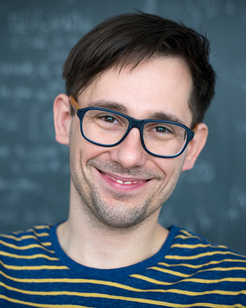Venture capital for an innovative project
Young researcher will use top science award to establish a new research group at the AEI

Dr. Michal Heller will be cooperating closely with the division “Quantum Gravity and Unified Theories” led by Prof. Dr. Hermann Nicolai. He is - after Daniele Oriti in 2008 and Yanbei Chen in 2004 - the third Kovalevskaja Award winner to join the AEI.
„The AEI is a fantastic environment for my research and for gravitational physics in general. That is why I am extremely enthusiastic about the opportunity to work there”, says Dr. Heller.
The award ceremony will take place on the 15th of November 2016 in Berlin.
Quantum physics and what black holes reveal about our world – that is what Dr. Heller’s research is all about
Is our three-dimensional world really a hologram? Some physicists suspect this might be the case considering observations of black holes. Similar to Plato’s Allegory of the Cave, the holographic principle means that everything we are able to sense is just an image or a shadow of a reality located elsewhere – just as a holographic image appears to be three-dimensional even though it is based on information encoded on a flat surface. Using holographic theory and mathematical instruments such as tensor networks, Dr. Michal Heller examines exotic forms of matter, like the quark-gluon plasma, and the conditions inside and at the surface of black holes. Dr. Heller’s research goal is shedding new light on the emergence of spacetime and quantum field theories.
Dr. Michal P. Heller
Born in Poland in 1984, Michal Heller studied Physics at the Jagiellonian University of Cracow, Poland, where he obtained his Ph.D. in 2010. During his studies, he spent time doing research in the UK, France, Israel and the MIT in Cambridge, USA. As a post-doc, Dr. Heller first worked at the University of Amsterdam. He then joined the Perimeter Institute for Theoretical Physics in Waterloo, Canada, in 2014.
The Sofja Kovalevskaja Award of the Alexander von Humboldt Foundation
The Sofja Kovalevskaja Award is given to internationally sought-after research talents at the beginning of their careers to provide risk capital for innovative projects. Award winners can build up their own research groups at German universities and research institutes of their own choice and work there for five years. The Award is funded by the German Federal Ministry of Education and Research.












